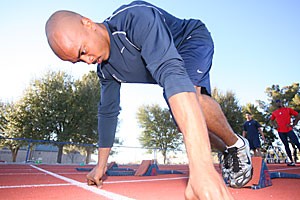Troy Harris took the less-traveled path toward becoming a Dean’s List student on the UA track and field team.
Harris, now a UA sprinter and media arts senior, keeps his plate full with football, track and field and working as a resident assistant at the Apache-Santa Cruz Residence Hall.
But just before attending Arizona, Harris spent 30 days surrounded by drug traffickers, domestic violence offenders and other criminals in Maricopa County’s Tent City Jail.
Harris served his 30-day jail sentence after being convicted of his second driving under the influence offense in his hometown of Phoenix.
“”Mentally day after day knowing I have to return to (Tent City) was tough,”” said Harris, who worked at a Blimpie and a gas station as part of a Tent City work-release program.
Living in a tent and sleeping on bunk beds surrounded by other criminals in the middle of the scalding Arizona summer was not the worst part about being in Tent City.
Nor was being awakened by guards searching for illegal contraband in the middle of the night.
Harris said the worst part of the whole experience was letting down his family and himself.
Before going to jail, Harris had a long talk with his father that he said “”hit me like a bullet to the chest.””
“”I sat down for a second and was like, ‘What are you doing?’ I looked in the mirror and said, ‘Troy, it’s time to change,'”” Harris said.
Harris made the change when he moved to Tucson in fall 2005 to pursue a media arts degree to accompany his associate degree in film production from Scottsdale Community College.
In his first semester at Arizona, Harris became his residence hall’s council president, worked for UATV and walked on to the track and field team.
Harris continued to work for UATV until he had to quit a month into the track season to focus on track.
Harris, who competed in track and field from seventh grade through his senior year of high school, barely cleared the necessary paperwork in time to try out for the team.
“”I went out and ran one of the fastest times (in the 30-meter dash), and the (head coach Fred Harvey) was like, ‘He’s a keeper,'”” Harris said.
Harvey said Harris’ DUI was not an issue in letting him walk on to the team and that Harris’ great character made for an easy decision.
Harris did not compete with the SCC track team because he thought he had more potential in football.
Injuries prevented him from trying out for the football team his first year at Arizona, but he was able to walk on to the team for the 2006 season.
Although Harris, a wide receiver, never played during the season, he still enjoyed his experience.
“”I don’t like to quit,”” he said. “”I said I’m going to do it, and I’m going to finish it.””
Harvey was pleased that Harris did not travel with the football team and that he was able to participate in weekend track practices.
“”He is much more mature in terms of understanding the sport. He’s getting a better grasp of being a collegiate sprinter,”” Harvey said of Harris’ growth on the team.
As soon as the football season ended, Harris began working full time with the track team, which Harris didn’t mind because it gave him a chance to stay in shape.
“”He does everything pretty hard. All of the dynamics are starting to pay off,”” said Harris’s former football teammate and current UA shot put competitor Shawn Best. “”All of his coaches have molded him into a great sprinter.””
Harris achieved a 4.0 grade point average last semester while taking five classes and juggling football and track practices. He plans on graduating in May and hopes to work in Connecticut as an ESPN intern this summer.
Harris loves working in front of or behind the camera and his dream is to become a feature film director.
When he has a break from track and classes, the self-described overachiever writes poetry and rap lyrics in hopes of one day getting his work published.
“”People wonder why I do so much stuff,”” Harris said. “”I never want to turn back to that life (in jail), so I just do as much as I can to stay busy and stay out of trouble.””









